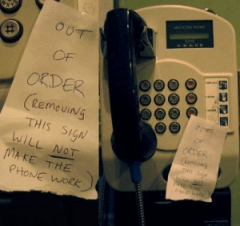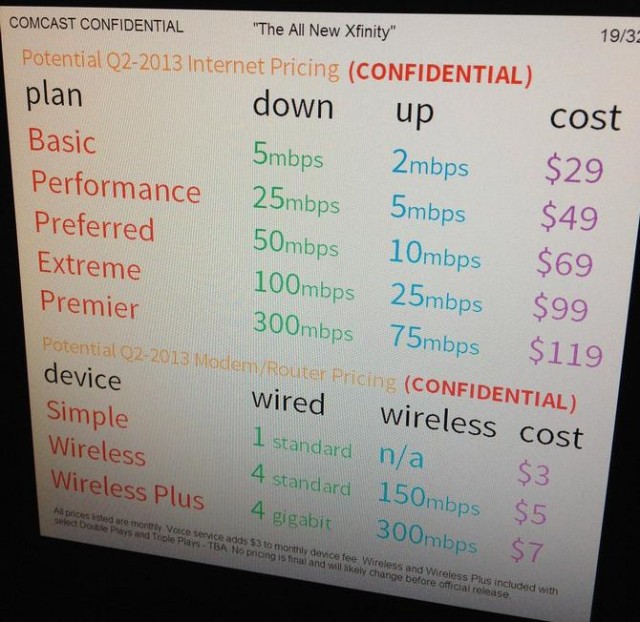 Nearly four months after Hurricane Sandy struck Manhattan, many customers are still waiting to get their phone and Internet service restored.
Nearly four months after Hurricane Sandy struck Manhattan, many customers are still waiting to get their phone and Internet service restored.
Verizon’s black hole extends across parts of Lower Manhattan, such as along Avenue C, roughly from Third Street to Tenth Street. There, business transactions are often “cash-only,” because stores and bars have no ability to process credit card transactions. But getting cash can also be difficult as ATMs, which also rely on Verizon’s network, display the same “Offline” message they have shown for more than three months.
Some of Verizon’s customers are fed up, especially after the company started asking customers to pay for phone and broadband service they don’t have. Several customers report the company expects its monthly bills to be paid, with complicated service credits forthcoming after payments are applied. Customers who don’t pay have been assessed late fees or face collection activity for service that has not worked since Halloween.
WNYC Radio reports it has been nearly four months since Hurricane Sandy hit the northeastern U.S. and large sections of Lower Manhattan still don’t have phone or broadband service from Verizon. (February 13, 2012) (4 minutes)
You must remain on this page to hear the clip, or you can download the clip and listen later.
Verizon does not seem to be in much of a hurry, a point of contention with the New York State Public Service Commission, which may be preparing to fine Verizon yet again for failing to meet service standards. The company has been on probation with the PSC for some time. Last summer, the regulator fined Verizon $100,000 for missing required service standards during the month of July, 2012. More than 1,100 of 5,400 reported outages were not repaired within the required 24 hours.
 That was an improvement over how the company performed in October and December, 2011, where prolonged service outages provoked the PSC to eventually fine Verizon $400,000.
That was an improvement over how the company performed in October and December, 2011, where prolonged service outages provoked the PSC to eventually fine Verizon $400,000.
This time Verizon wants a free pass from more fines, claiming enormous restoration efforts necessitated by Sandy are responsible for any delayed response.
Assistant Attorney General Keith Gordon is not buying it. He called Verizon’s reports on outages “disingenuous at best,” and accused Verizon of manipulating data and delivering incomplete outage statistics.
Nobody outside of Verizon knows how many New Yorkers still lack phone or Internet service — the PSC is obligated to keep specific numbers private at the behest of the telecommunications companies themselves.
“Given the fact that the telecommunication industry is highly competitive, such information is considered confidential,” James Denn, a PSC spokesperson told WNYC Radio.
[flv width=”534″ height=”320″]http://www.phillipdampier.com/video/NY1 Lower Manhattan Resident Has Lost Phone Service For Months Following Sandy 1-15-13.mp4[/flv]
NY1 reports on Greenwich Village residents who are still without Verizon service months after Sandy. They claim Verizon broke multiple promises to get service restored. (1 minute)
 The Bloomberg Administration strongly disagrees with the PSC’s handling of outage information.
The Bloomberg Administration strongly disagrees with the PSC’s handling of outage information.
“This information should also be made publicly available to consumers so they may track the status repairs, obtain reasonable estimates as to when service might be restored, and compare performance across competing carriers,” said Rahul Merchant, chief information and innovation officer for New York City.
For customers who can’t manage their businesses without phone or Internet service, relief is coming from an increasingly aggressive Time Warner Cable.
Verizon’s largest rival has dispatched armies of salespeople onto the streets in Verizon-deprived areas. The cable company has begun to steal away a number of out-of-service Verizon customers.
That occasionally comes as a surprise to Verizon workers that show up to make repairs, only to be told “I quit you two weeks ago,” by annoyed business owners.
Verizon never got the message.
[flv width=”624″ height=”372″]http://www.phillipdampier.com/video/WNBC New York Sandy-Damaged High School Still Without Phone Service 3 Months After Storm 2-6-13.flv[/flv]
WNBC reports this New York City high school has been left without Verizon service for three months, forcing teachers and staff to use cell phones to communicate. (2 minutes)


 Subscribe
Subscribe

 A handful of broadcasters in California, Michigan, Montana and New Mexico interrupted their regularly scheduled programs earlier this week to warn audiences that zombie attacks were underway and residents should avoid the undead at all costs.
A handful of broadcasters in California, Michigan, Montana and New Mexico interrupted their regularly scheduled programs earlier this week to warn audiences that zombie attacks were underway and residents should avoid the undead at all costs. Time Warner Cable customers in the Carolinas will soon pay $90.49 a month for digital cable television, including one set-top cable box. Customers who buy broadband, television, and phone service will see their monthly bill rise to $167.89.
Time Warner Cable customers in the Carolinas will soon pay $90.49 a month for digital cable television, including one set-top cable box. Customers who buy broadband, television, and phone service will see their monthly bill rise to $167.89. Broadcast cable: From $16.19 to $17.99
Broadcast cable: From $16.19 to $17.99 A handful of Georgia state legislators have introduced a bill to ban community-owned broadband anywhere Internet service is available at speeds of at least 1.5Mbps — so slow it does not even meet the FCC’s new definition of “broadband.”
A handful of Georgia state legislators have introduced a bill to ban community-owned broadband anywhere Internet service is available at speeds of at least 1.5Mbps — so slow it does not even meet the FCC’s new definition of “broadband.”
